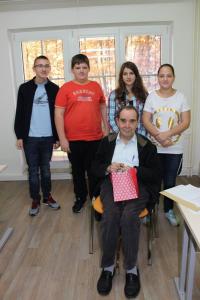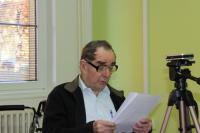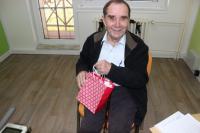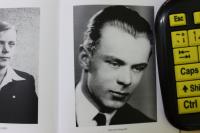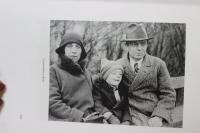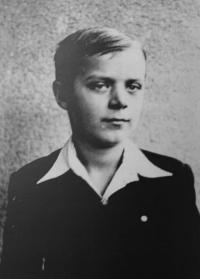I was a second class human twice in my life

Download image
Zdeněk Halaš was born on 21 August, 1924 in Prague to Marie and Josef Halaš. His father, Josef, was a trained carpenter while his mother, Marie, née Svobodová, was a state approved piano teacher. She visited rich Prague Jewish families to teach young ladies to play the piano. Zdeněk was wounded twice during the first world war. After returning from military service, he studied construction at the secondary technical. He soon started working in the Prague Municipality as an officer in the Prague waterworks. Since Zdeněk’s parents were rather busy, Zdeněk Halaš was raised primarily by his grandmother. A couple of his earliest childhood memories is a tonsillectomy in hospital na Karlově and a Zeppelin flight over Prague. Zdeněk attended an elementary school in Vinohrady, then a proper gymnasium (similar to a high school) also in Vinohrady. Following graduation, he tried to avoid working for the Reich, so he began riding a horse as a delivery man in Prague. However, he was assigned by the working office at the post office in Prague-Střešovice and didn’t avoid forced labour. On December 18, 1942, Zdeněk was ordered to work at the Reich office in Frankfurt. He was accommodated in a former hotel of a Jewish entrepreneur, Kristall Palast. Following a large air-raid of Frankfurt in November of 1943, Zdeněk left to Prague on his own and found a job in Prague-Letov in airplane production, where he worked in a tools department. On February 16, 1944, Zdeněk was arrested by police and forced to return to Frankfurt. Then, on March 24, 1944, the factory of Kristall Palast was burned down once more. So, on April 30, 1944, Zdeněk went to Fulda, a small town near Kassel, where he worked as a postman until February 1945. He returned back to Prague on March 31, 1945 after a demanding journey, and began work in a post office in Břevnov. It was there that he witnessed the arrival of the Soviet army. Shortly after the War, Zdeněk began studying at the Czech High Technical School in Prague-Dejvice at the High School of Chemistry and Engineering Technology. However, in May 1, 1949 due to an expulsion from studies by the result of so called, “study checks,” he began working in a factory making tubes in Chomutov. At the factory he worked in various positions until retiring in 1992 (during this time he also served two years in the military from 1949-1951). On July 26, 1952 Zdeněk Halaš married Jiřina Šaflerová. Together they had two children, Alenka and Pavel. After the political situation calmed down slightly, he got a chance to finish his studies at the High Mining School in Ostrava. He finally graduated on June 12, 1965 at the age of 41. Apart from lecturing and publication activities, Zdeněk Halaš was also active as a translator and an interpreter at the tube mill. And because of his ability to speak German, he was able to work in West Germany as a consultant, traveling to many tube mills in the former Soviet Union, Hungary, Poland, and in Sweden. He also managed to hold a position as chairman of a skiing club. Today he lives with his wife in a Senior House in Jirkov.
